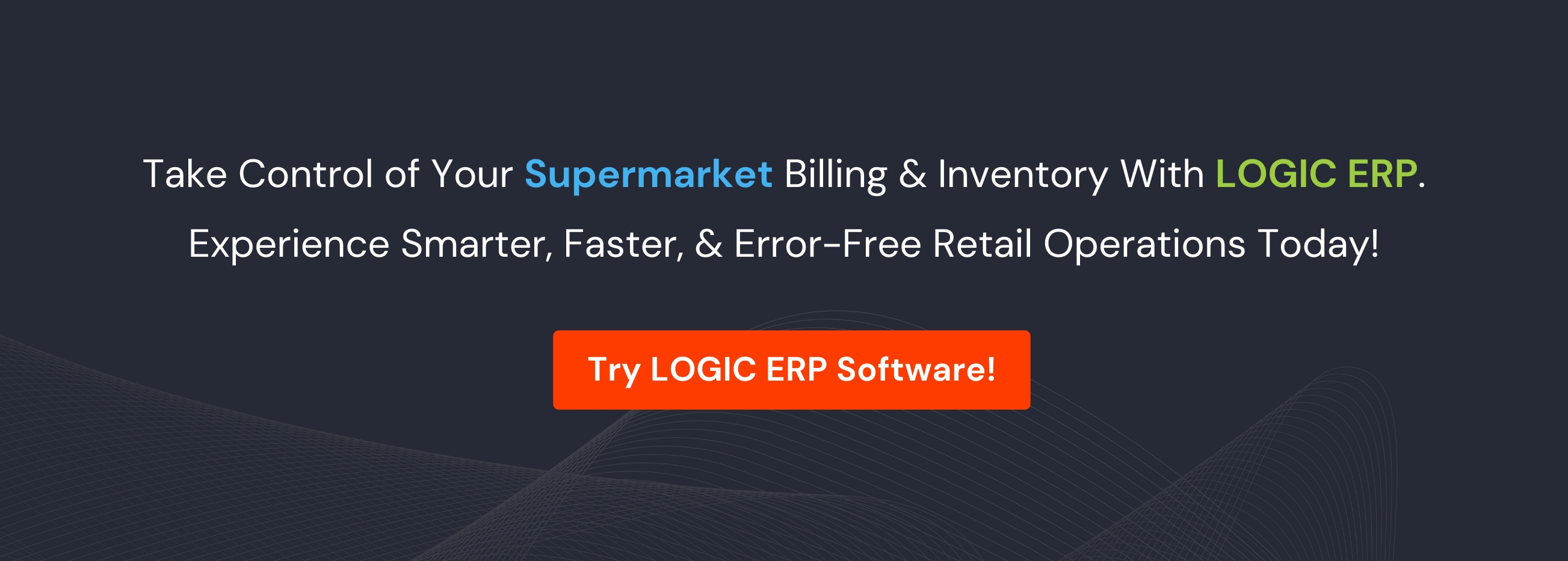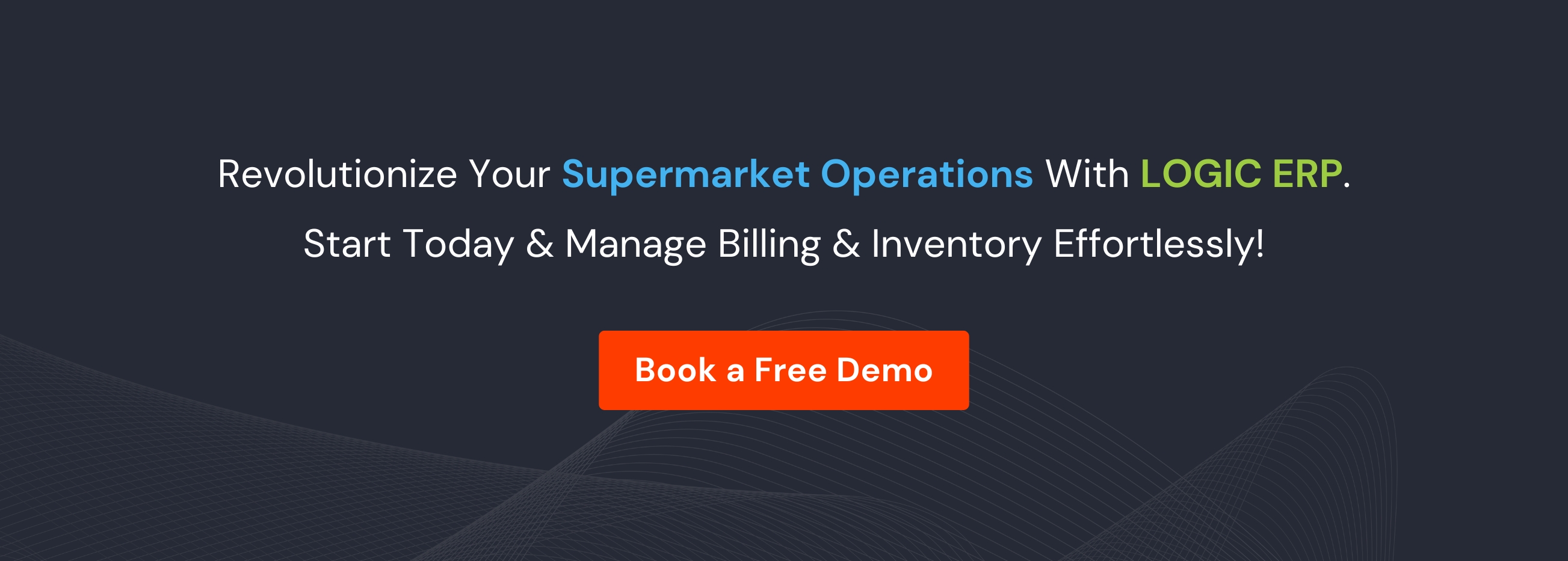Why is LOGIC ERP the Best Supermarket POS Software for Retail Billing and Inventory Operations?


Introduction to LOGIC ERP for Modern Supermarkets
If you’re running a supermarket, you already know how challenging it is to manage thousands of SKUs, long customer queues, expiry-sensitive items, and complex inventory cycles. In today’s digital world, supermarket retailers have widely adapted technology like robust POS and ERP systems to streamline their business operations.
LOGIC ERP : the best supermarket POS software for retail billing and inventory operations, has proven to be the best point of sale to meet the unique demands of retailers dealing in supermarket, hypermarket and grocery multi-store chain businesses.
Here’s an in-depth look at what makes LOGIC ERP : #1 point of sale for supermarket operations, and how it helps transform challenges into competitive strength.
1. Supercharged POS for High-Volume, Accurate Billing
- Advanced POS Architecture: LOGIC ERP POS (Point of Sale) is highly configurable, with support for mobile and touchscreen systems.
- Weighing Scale Integration: For perishable goods like fruits and vegetables, LOGIC ERP connects directly to weighing scales. The system auto-captures weight, minimizing manual errors.
- Conversion Factors Support: The software supports conversion between purchase and sales units (for example, buying in dozens or cases, selling in pieces).
- Multi-Payment Modes: From cash to UPI, wallets, credit/debit cards, POS supports all major payment types. It integrates with gateways including PayTM, PayU, Jio Money, and more.
- Billing Efficiency: Features like “bill hold & recall,” flexible scheme and promotions (including combos, mix-and-match, BOGO), and expiry prompts make the checkout both fast and intelligent.
- Cashier Shift Management: The system supports shift-based cashier operations, enabling secure cash management and better accountability.
Business Impact: Faster checkouts, reduced billing errors, and improved customer throughput during peak hours, all while keeping POS operations tightly integrated with backend inventory.
2. Real-Time, Granular Inventory Management
- Batch/MRP-Level Tracking: LOGIC ERP supports inventory tracking at the batch or MRP level, which is critical for grocery goods with varying prices or expiration.
- Expiry Management & Alerts: The software actively tracks expiry dates, triggers alerts, and enforces FEFO (First Expiry First Out) logic, helping supermarkets minimize wastage.
- Rack / Shelf-Level Stock Control: LOGIC ERP supports rack-wise inventory — store managers can locate SKUs precisely and perform efficient restocking.
- Barcode Management: You can generate custom barcodes, import item masters via Excel, and maintain precise SKU data.
- Slow and Dead Stock Analysis: The system provides reports to identify slow-moving or dead SKUs, helping retailers optimize stock turnover and make data-driven clearance decisions.
Business Impact: Enhanced inventory visibility, reduced spoilage and dead stock, and more efficient shelf management, all contributing to cost savings and higher store productivity.
3. Centralized Multi-Store & Chain Management
- Unified Store Master: For supermarket chains, LOGIC ERP enables centralized management of product master data, pricing, and promotions.
- Multi-Outlet Inventory & Replenishment: Real-time sync across stores and warehouses helps track stock in transit, enables inter-store transfers, and supports intelligent replenishment.
- Consistent Promotions: Centralized scheme definition means uniform promotions across all outlets or region-wise differentiation.
- Performance Reporting: The head office can view consolidated dashboards to compare store performances, sales trends, inventory KPIs, and more.
Business Impact: A single source of truth for all stores, reducing fragmentation, enabling scale, and improving operational control.
4. Procurement Automation & Vendor Management
- Automated PO Generation: LOGIC ERP suggests or generates purchase orders based on min/max reorder levels, sales trends, and forecasted demand.
- Vendor Evaluation: Through RFQ (Request for Quotation), supplier comparison, and vendor scorecards, the platform enables data-driven supplier management.
- Receipt & Invoice Matching: Goods receipt notes (GRNs) can be matched with vendor invoices to ensure billing accuracy. LOGIC also handles returns, damaged, or expired items.
- Bulk Import: Purchase orders or supplier data can be imported via Excel or text files, reducing manual data entry.
Business Impact: More efficient procurement, lower disputes with vendors, and better cash-flow forecasting.
5. Integrated Accounting & GST Compliance
- Built-in Accounting Module: LOGIC ERP handles ledger entries, bank reconciliation, cash flows, expense tracking, and financial statements, all in real time.
- GST Ready: The system supports automated GST slab detection, HSN/SAC codes, e-way bills, and e-invoicing (where applicable).
- Tax Reporting: The platform simplifies tax reporting, you can generate GST-compliant invoices, track tax liabilities, and streamline GST return filing.
Business Impact: Reduced accounting overhead, fewer tax errors, and simplified compliance, eliminating the need for a separate accounting system.
6. Loyalty, CRM & Customer Engagement
- Built-In Loyalty Program: LOGIC ERP supports a points-based loyalty system, allowing supermarkets to reward repeat customers.
- Customer Segmentation: Using purchase history and CRM tools, you can group customers into segments (e.g., high-frequency, high-value) and run targeted marketing campaigns.
- Promotional Campaigns: Define and manage schemes, coupons, and discounts centrally. These apply automatically at POS, reducing manual effort and errors.
- Digital Engagement: With CRM data, supermarkets can engage customers via SMS or WhatsApp, and issue e-receipts for better retention and feedback.
Business Impact: Increased customer loyalty, better repeat purchase rates, and more effective promotional ROI.
7. Business Intelligence & Analytics
- Real-Time Dashboards: LOGIC ERP provides real-time insights — sales (hourly/daily), inventory health, top SKUs, and more.
- Demand Forecasting: By analyzing historical sales, the system helps predict future demand, enabling smarter replenishment and procurement.
- Inventory Aging & Shrinkage Analysis: Reports on aging stock, expiry risk, and shrinkage help management take proactive actions to mitigate loss.
- Profitability Tracking: Get detailed margin analysis (gross/net), category-wise performance, and vendor profitability to guide business strategy.
Business Impact: Data-driven decision making, optimized stock planning, and better margin management.
8. Operational Efficiency & Process Automation
- Auto-Replenishment: LOGIC ERP automates reordering, reducing manual procurement and ensuring in-stock availability of fast-moving items.
- Supply Chain Transparency: The system gives full visibility on inventory movement across stores and warehouses, helping plan inter-store transfers and optimize dispatches.
- Return & Waste Management: With batch and expiry tracking, it becomes much simpler to identify items for return, discount, or write-off.
- Hardware Integration: Deep integration with weighing scales, barcode printers, and other POS devices ensures smoother store operations.
Business Impact: Streamlined workflows, fewer manual bottlenecks, and better resource utilization across the supply chain.
9. Security, Compliance & Audit Controls
- Role-Based Access Control: Define roles (cashier, manager, admin) with granular permissions, ensuring only authorized personnel can perform critical tasks.
- Audit Trails: Every action including billing, price override, stock movement, is logged. This provides full traceability for audits or internal controls.
- Data Protection & Backup: With cloud deployment options, data is encrypted, backed up, and can be recovered in case of failures or security events.
- Cash Drawer Security: The POS system tracks cash drawer activities per shift, reducing risk of fraud or discrepancies.
Business Impact: Improved operational integrity, lower risk of internal fraud, and stronger compliance posture.
10. Deployment Flexibility & Scalability
- Cloud or On-Premise: LOGIC ERP supports both deployment models, giving flexibility based on store infrastructure and IT strategy.
- Scalable for Chains: The system is designed for multi-store expansion — every new outlet can be brought under the same ERP seamlessly.
- Device Agnostic: The POS works on desktops, tablets, or dedicated POS hardware, making it adaptable to different store layouts.
- User Training & Implementation: The LOGIC ERP team offers guided setup and training, supporting smooth onboarding for grocery retailers.
Business Impact: Easy scaling, minimal IT friction, and flexibility to grow without re-engineering systems.
11. Real-World Business Impact: Use Cases
- Peak-Hour Billing Efficiency: Supermarkets often face long queues during busy hours. With LOGIC ERP’s fast POS and efficient billing workflows, customer flow remains smooth, reducing wait times and improving satisfaction.
- Perishable Inventory Management: For fresh produce, bakery, or dairy, LOGIC ERP’s batch tracking and expiry alerts help prevent wastage and improve profitability.
- Inventory Rebalancing Across Stores: Using the centralized inventory and replenishment module, supermarkets can transfer stock intelligently between stores to match demand, reducing both overstock and stockouts.
- Vendor Performance Optimization: With procurement and vendor modules, buying teams can identify high-performing suppliers, negotiate better, and reduce supply chain disruptions.
- Data-Driven Growth: Business managers use dashboards and forecasting insights to plan promotions, optimize product mix, and drive margin expansion.
- Customer Loyalty Programs: Using CRM + loyalty modules, supermarkets run targeted campaigns, incentivize repeat shopping, and strengthen the bond with customers.
- Regulatory Compliance Made Easy: GST-ready billing and tax reporting save accounting teams from manual reconciliation and compliance burden.
12. Why is LOGIC ERP a Better Choice than Basic POS or Standalone Billing Software?
| Challenge in Supermarket | LOGIC ERP Advantage |
|---|---|
| Slow or error-prone billing | High-speed POS, weighing-scale integration, scheme automation |
| Shrinkage, expiry losses | Batch-wise inventory, FEFO, expiry alerts |
| Disparate systems (POS, accounting, procurement) | Unified ERP + POS solution |
| Multi-store coordination | Centralized control + inter-store stock transfers |
| Vendor management complexity | RFQ, PO automation, performance tracking |
| Compliance burden | Integrated accounting + GST support |
| Inconsistent customer retention | Built-in CRM, loyalty, promotions |
| Lack of data insights | Real-time dashboards, forecasting, BI |
Conclusion
LOGIC ERP is India’s #1 supermarket POS software system that meets the end-to-end operational needs of grocery retail. From ultra-fast billing and real-time inventory tracking to procurement automation, financial compliance, and customer loyalty, it delivers a fully integrated, scalable solution.
For all supermarkets from a single store or a nationwide chain, LOGIC ERP enables:
- Better customer experience (faster checkout, loyalty)
- Operational efficiency (automated replenishment, audit controls)
- Cost savings (reduced wastage, optimized procurement)
- Strategic agility (data-driven decisions, demand forecasting)
- Compliance and growth readiness (GST, multi-store scalability)
In short, LOGIC ERP empowers supermarkets to run smarter, grow faster, and operate with greater transparency and control. Call at +91-73411-41176 or send us an email at sales@logicerp.com to book a free demo for supermarket POS software with billing and inventory management today!
Frequently Asked Questions (FAQs)
1. What is LOGIC ERP Supermarket POS Software?
LOGIC ERP is an integrated retail management solution that combines POS, inventory, accounting, purchasing, CRM, and analytics into one unified platform. It is designed specifically to meet the complex operational needs of supermarkets and grocery chains.
2. Why is LOGIC ERP considered the best software for supermarkets?
Because LOGIC ERP offers the complete supermarket workflow from fast billing and weighing-scale integration to expiry management, multi-store control, GST compliance, and loyalty programs, all in a single system.
3. Does LOGIC ERP supermarket point of sale software support weighing scales?
Yes. LOGIC ERP supermarket software integrates directly with barcode-based and electronic weighing scales. The weight is automatically captured at POS for fast and error-free checkout.
4. Can supermarkets manage expiry dates using LOGIC ERP?
Yes. The system supports batch-wise tracking, expiry management, FEFO, and automated expiry alerts to reduce wastage.
5. Is LOGIC ERP suitable for multi-store supermarket chains?
Yes. LOGIC ERP supermarket point of sale system offers centralized control for pricing, inventory, promotions, reporting, and inter-branch transfers.
6. Does LOGIC ERP support GST billing and tax compliance?
Yes. LOGIC ERP supermarket POS software is fully GST-ready and includes automated HSN/SAC codes, GST invoices, e-way bills, and integrated tax reporting.
7. Can LOGIC ERP supermarket POS software handle offers, discounts, and promotions?
Yes. Supermarkets can run BOGO, mix & match, combo discounts, bill-level discounts, and time-based offers, all applied automatically at POS.
8. Does LOGIC ERP supermarket software include a loyalty program?
Yes. LOGIC ERP supermarket point of sale software offers a points-based loyalty system, customer segmentation, and targeted SMS/WhatsApp campaigns.
9. Can LOGIC ERP supermarket software integrate with barcode printers and scanners?
Yes. It supports barcode label printers, handheld scanners, QR scanners, and mobile barcode apps.
10. Does LOGIC ERP work on the cloud?
Yes. LOGIC ERP supports both cloud-based and on-premise deployments.
11. Is the POS fast enough for high-volume supermarket billing?
Yes. LOGIC ERP POS system is optimized for high-speed billing, multiple payment modes, bill hold/recall, and offline functionality.
12. What type of reports does LOGIC ERP supermarket software provide?
LOGIC ERP supermarket software with point of sale offers sales dashboards, stock aging, expiry reports, vendor scorecards, purchase analytics, and complete financial statements.
13. How does inventory management work in LOGIC ERP supermarket software?
Inventory includes batch-wise tracking, rack-wise stock, reorder levels, auto replenishment, stock transfers, and slow/fast-moving item analysis.
14. Can LOGIC ERP supermarket software manage online orders or omnichannel retail?
Yes. LOGIC ERP integrates with online stores, mobile apps, marketplaces, and delivery platforms for unified order management.
15. Is staff training available for using LOGIC ERP?
Yes. The LOGIC ERP team provides on-site or remote training, onboarding, and continuous support.
16. How long does it take to implement LOGIC ERP POS software in a supermarket?
Small stores typically take 1–2 weeks, while large chains may take 3–6 weeks depending on customization and data migration.
17. Can LOGIC ERP supermarket POS software reduce inventory loss and shrinkage?
Yes. Features like audit logs, stock variance reporting, expiry control, and permissions reduce shrinkage significantly.
18. What hardware is required to run LOGIC ERP?
It supports POS terminals, desktops, tablets, barcode scanners, weighing scales, and thermal printers.
19. Is customer support available?
Yes. LOGIC ERP provides support through phone, email, tickets, remote access, and AMC-based dedicated support.
20. How can I get a demo of LOGIC ERP for my supermarket?
You can request a free demo through their official website or contact their sales team for an on-site or virtual walkthrough. Call at +91-73411-41176 or send us an email at sales@logicerp.com to book a free demo for supermarket POS software with retail billing and inventory management today!




